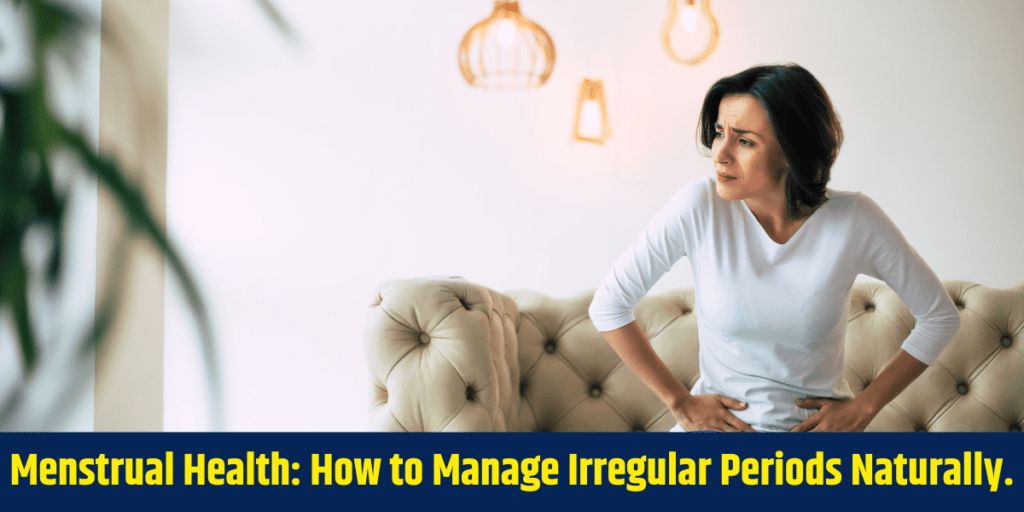Menstrual Health: How to Manage Irregular Periods Naturally.
Menstrual health is an important part of a woman’s overall well-being, and many women visit a gynecologist in Kalyani Nagar for help when they experience irregular periods. These irregularities can mean your cycle is longer or shorter than usual, or your flow may be heavier or lighter. This can be frustrating and confusing. However, there are natural ways to manage these issues. In this blog, we’ll explore what causes irregular periods and share practical tips to help you regulate your cycle naturally. Whether it’s through diet, exercise, or stress management, small changes can make a big difference in your menstrual health. For personalized advice and care, consider consulting Dr. Pushpa Soni.
What are Irregular Periods?
Irregular periods are cycles that vary in length, frequency, or flow. A typical menstrual cycle lasts between 21 and 35 days, and it’s common for women to experience variations. However, cycles shorter than 21 days or longer than 35 days may indicate irregularities.
What Causes Irregular Periods?
Several factors can lead to irregular periods, including:
Hormonal Imbalances: Fluctuations in hormones like estrogen and progesterone can disrupt the menstrual cycle.
Stress: High stress levels can impact the hypothalamus, which regulates the menstrual cycle.
Diet and Nutrition: Poor nutrition or sudden weight changes can affect hormone levels.
Excessive Exercise: Intense physical activity can disrupt normal hormonal function.
Medical Conditions: Conditions such as Polycystic Ovary Syndrome (PCOS), thyroid disorders, and fibroids can lead to irregular cycles.
How Can I Manage Irregular Periods Naturally?
Here are several natural strategies to help manage irregular periods:
Maintain a Healthy Diet
A balanced diet rich in fruits, vegetables, whole grains, and lean proteins can support hormonal balance. Nutrients such as iron, magnesium, and vitamins B and D play a crucial role in menstrual health.
Stay Hydrated
Drinking plenty of water helps maintain overall health and can alleviate bloating or discomfort associated with menstruation.
Manage Stress
Practicing relaxation techniques such as yoga, meditation, or deep-breathing exercises can help reduce stress levels, which may stabilize your menstrual cycle.
Regular Exercise
Engaging in moderate physical activity can help regulate hormones and reduce stress. Aim for at least 30 minutes of exercise most days of the week.
Maintain a Healthy Weight
Both underweight and overweight conditions can affect your menstrual cycle. If you’re struggling with weight issues, consider consulting Dr. Pushpa Soni, a trusted gynecologist in Kalyani Nagar, for personalized advice.
Herbal Remedies
Some herbal remedies may help regulate menstrual cycles. For example, vitex (chaste tree berry) is thought to balance hormones, while ginger and turmeric may reduce inflammation. Always consult a healthcare professional before starting any herbal treatment.
Monitor Your Cycle
Keeping track of your menstrual cycle using a calendar or app can help you identify patterns and triggers for irregularities. This information can be valuable when discussing your symptoms with a healthcare provider.
When Should I See a Doctor?
You should see a doctor for irregular periods if you experience severe pain that disrupts your daily activities, heavy bleeding that requires you to change pads or tampons every hour, or if your cycles are consistently shorter than 21 days or longer than 35 days. Additionally, if you notice concerning symptoms such as excessive hair growth, acne, weight gain, or breast discharge, it’s important to seek medical advice. Sudden changes in your menstrual cycle after the age of 40 or signs of potential pregnancy also warrant a consultation with a healthcare provider like Dr. Pushpa Soni, a gynecologist in Kalyani Nagar, who can help diagnose any underlying issues and recommend appropriate treatments.
Managing irregular periods naturally involves a holistic approach that includes diet, lifestyle changes, and stress management. By making these adjustments, many women find relief and improvement in their menstrual health. If you experience persistent irregularities, don’t hesitate to reach out to healthcare provider Dr. Pushpa Soni for guidance.

